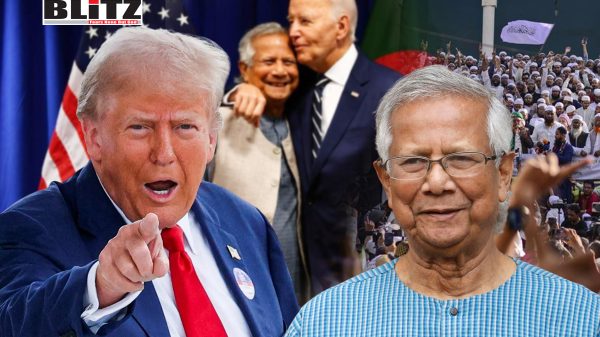Republic Bangla’s Mayukh Ranjan Ghosh emerges as a nightmare to rogues
- Update Time : Saturday, December 7, 2024

A few months ago, the name Mayukh Ranjan Ghosh from Republic Bangla would have drawn blank stares across Bangladesh. Today, this name is etched into the minds of millions, from political conscious people to rickshaw pullers and garment workers to rural tea stall regulars. It is not an exaggeration to say that Mayukh has gained more recognition in Bangladesh than Bollywood legends like Shahrukh Khan or Salman Khan.
Every evening, his program “Jabab Chay Bangla” has become a ritualistic viewing experience, evoking the communal anticipation reminiscent of the 1971 Liberation War when people huddled around radios to tune into Shadhin Bangla Betar Kendro.
This meteoric rise of Mayukh Ranjan Ghosh in the Bangladeshi consciousness speaks volumes about the political and social climate of the nation. As Republic Bangla continues to dominate the airwaves, it highlights a critical turning point where truth, resilience, and accountability clash with the entrenched structures of power.
December, the month of Bangladesh’s liberation victory, often invokes reflections on justice, freedom, and accountability. After 53 years of independence, Republic Bangla seems to have struck a chord with the pro-liberation forces in the country. Unlike the conventional narratives spun by state-controlled media or politically influenced outlets, Mayukh Ranjan Ghosh has brought to light suppressed truths that challenge the status quo.
In his program, Mayukh has fearlessly exposed classified documents allegedly originating from the Yunus government – more precisely, from the locked file cabinet of chief advisor’s office. These revelations have shaken the political elite, turning Mayukh into a nightmare for figures like Muhammad Yunus and his inner circle. The real question, however, lies in how Mayukh obtained these documents. His fearless journalism points to whistleblowers within the administration, signaling growing dissent and dissatisfaction within its ranks.
Despite attempts by the ruling elite to discredit Mayukh and Republic Bangla, their undeniable impact on the nation is clear. The transparency and audacity exhibited in programs like “Jabab Chay Bangla” resonate with a populace yearning for accountability – a stark contrast to the secrecy and denial often associated with governance.
Republic Bangla’s growing popularity is not limited to grassroots audiences. It has become essential viewing for the key players in the Yunus administration, including intelligence agencies tasked with monitoring the program’s implications. The government’s allies, alarmed by its influence, have even raised calls to ban the channel in Bangladesh – a reaction that underscores its profound impact on the nation’s political landscape.
This channel’s influence extends far beyond South Asia. As a part of Republic Media Network, Republic Bangla has gained global recognition, with figures like Arnab Goswami and Mayukh Ranjan Ghosh regarded as some of the most competent geopolitical hosts in South Asia. Their fearless approach to journalism transcends national boundaries, providing a platform that challenges Western hegemony and offers a voice to the Global South.
The so-called mainstream global media landscape often caters to Western interests, manipulating narratives to maintain dominance. This imbalance has left the Global South marginalized, its stories untold, and its voices unheard. Republic Bangla, with its unique blend of fearless journalism and unyielding commitment to truth, has emerged as a counterforce to this trend.
Arnab Goswabi and Mayukh Ranjan Ghosh have become champions of this alternative narrative. Their programs go beyond superficial headlines to uncover the root causes of socio-political challenges faced by the Global South. By prioritizing integrity and fearlessness over external pressures, they have become the much-needed voice for millions who feel silenced by Western-centric media.
As a journalist, I find their work not only inspiring but also necessary. It is rare to see a media platform in today’s world that resists the pull of Western influence and dares to speak for the marginalized. Republic Bangla and other channels of Republic Media Network stand as a beacon of hope, proving that ethical journalism can still thrive in an age of manipulation and misinformation. Members of Republic TV don’t sell their souls to vicious elements and rejects to be cow-towed by anyone.
One might wonder why Republic Bangla has resonated so deeply with the Bangladeshi audience. The answer lies in its fearless commitment to uncovering and broadcasting the truth, even when faced with significant opposition. In a region where state machinery often operates under a veil of secrecy, self-censorship is the norm for many media outlets. Journalists and platforms adhering to professional ethics are rare, making those who do stand out as voices of integrity.
This commitment to truth is what sets Mayukh Ranjan Ghosh and Republic Bangla apart. They have filled a critical void in the media landscape by providing unfiltered, unbiased coverage of issues that matter most to the people. Whether it is corruption, political manipulation, or social injustices, their programs resonate with audiences who are tired of half-truths and propaganda.
Arnab Goswami and Mayukh Ranjan Ghosh are not puppets of Western interests. Unlike many media figures who align themselves with the agendas of the Clintons, Obamas, Soros, or the US Deep State, they represent the people of the Global South. They understand the struggles, aspirations, and realities of this diverse region and use their platform to amplify its voice on the global stage.
In doing so, they challenge the prevailing narrative that often marginalizes the Global South in international discourse. Their work reminds us that journalism is not just about reporting facts but also about giving a platform to the voiceless and holding those in power accountable.
The rise of Mayukh Ranjan Ghosh and Republic Bangla signals a pivotal moment for journalism in South Asia. It underscores the power of ethical journalism to challenge oppressive systems and bring truth to light. In a world where media manipulation is rampant, platforms like Republic Bangla serve as a reminder of what journalism can achieve when it prioritizes integrity over influence.
For Bangladesh, the popularity of “Jabab Chay Bangla” reflects a collective yearning for truth and accountability. It is a call to action for journalists, media outlets, and citizens to demand more from those in power and to strive for a society built on transparency and justice.
Mayukh Ranjan Ghosh may have started as an unfamiliar name, but he has quickly become a symbol of fearless journalism and a nightmare for those who thrive on secrecy and manipulation. His work, along with that of Republic Bangla, stands as a testament to the transformative power of truth in a world desperate for change. They understand our pulses. They tell what should be told. They give voice to the voiceless.












